 Washington Trails
Association
Washington Trails
Association
Trails for everyone, forever
Past participants of WTA's Emerging Leaders Program chat about what they're up to now and how their time in the program has helped inform their careers so far.
In its first few years, WTA’s Emerging Leaders Program was centrally focused on trail work. After much development, the program is now centered around three main components: professional development, leadership skills, and trail maintenance technical skills. The program provides a variety of days around these components for cohort members to learn together and in an inclusive community.
Once the program is complete, cohort members embark on their next pathway in their careers and Angelic Friday, Emerging Leaders project coordinator, was able to catch up with a few of them.
Those conversations are below.
Learn more & apply for the 2025 Emerging Leader Program
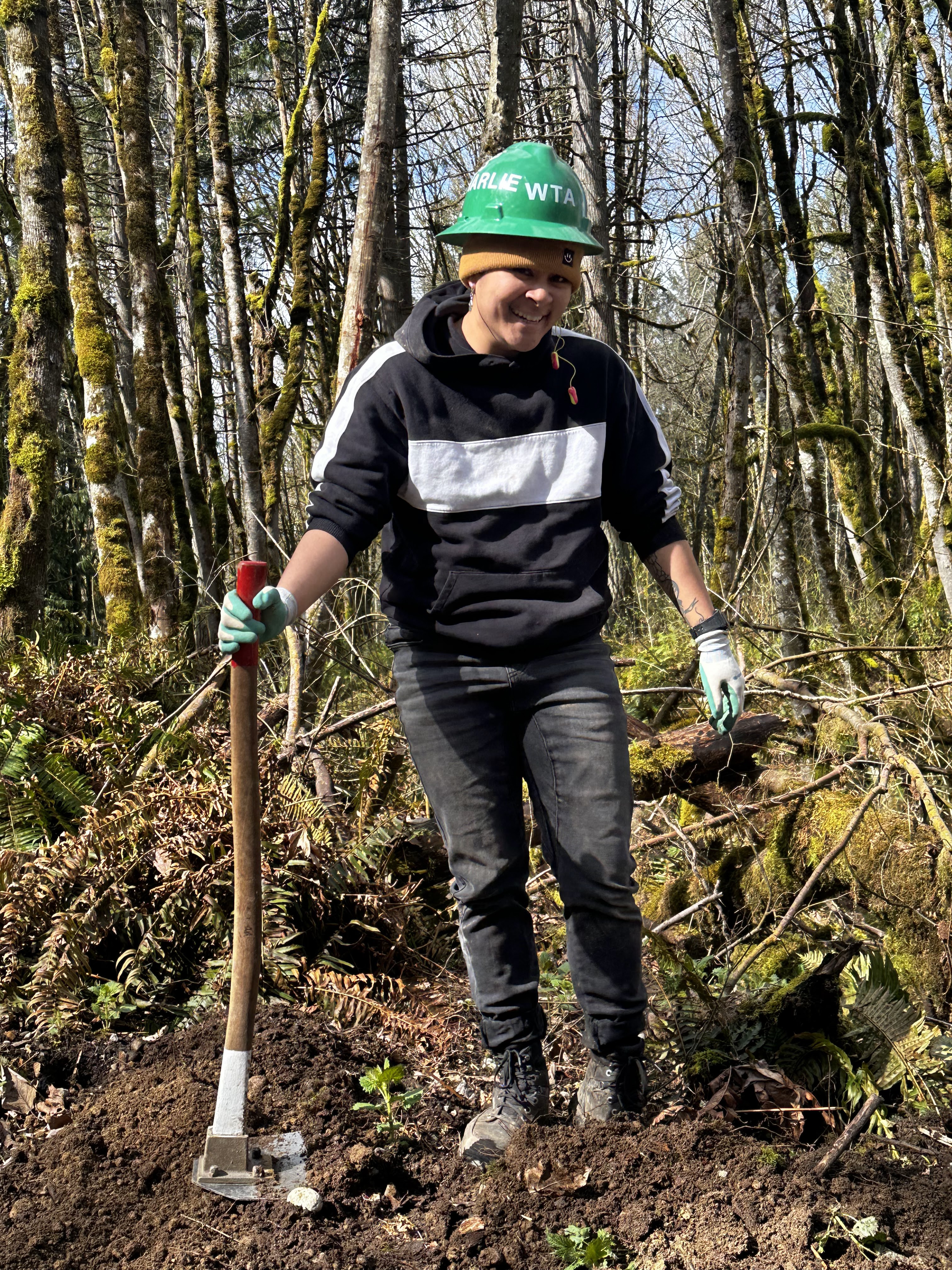
What drew you to the Emerging Leaders Program (ELP)?
The summer before, I worked at WTA for their volunteer youth program, Volunteer Vacations. Sarah Williams, who works in one of the Outdoor Leadership Training program gear libraries, introduced it to me. It just sounded really cool, and I was like, yeah, no that sounds amazing. So I applied and then I got it. I checked it out and it sounded really right-up-my-alley type of thing, and I wanted to have more BIPOC, (Black, Indigenous, and People of Color), centric experiences, too, for work.
What is one of your favorite memories from your season?
Definitely the backpacking trip. Just like the entire trip itself. Also because I did write my own article about it. I think the memory that comes to mind is when we were all singing on the boardwalk and trying to not have bears near us. So we're like, let's be loud. Then Angelic and MJ started us off, and then everyone kind of started doing their own little thing. We were just singing and like, pop-corning to each other, and it was just really organic and fun.
Then also just like being on trail itself: I think when we were all beginning to work on building stairs that one week and it was a difficult week. Something about us all being together was really refreshing amidst all of the challenges that were arising (like social interactions and then also the physical difficulties of that project in general). Something about the resilience of our team kind of coming together and just hanging out and checking in on each other. It was really wholesome.
What is something that you're proud of from the season and that you were able to take away?
Crosscutting. Honestly, I had a lot of anxiety and fear around [it], but everyone was encouraging us to try it out. Afterwards, the group told me I had a natural knack for assessing trees, which is something that I felt really accomplished about. Being able to kind of witness each other's different levels of difficulty versus ease and encouraging each other that way was really nice. I felt really accomplished specifically walking away with that new skill set and anytime I hear about people crosscutting, I was like, oh, yeah, I've done that before.
Also I really enjoyed the social justice aspect too, and leaning into the ways we were able to create a space where we could just talk about our experiences as BIPOC individuals within a White-centric world essentially. Really having that bubble of support is what made me want to show up and be on trail. I don't think I would have stuck it out as long as we did. The cohort itself was what really kept me going, and the encouragement and support of the team.
How has ELP aided your professional goals and what do you do now?
It's such a wild jump. I'm still so astounded how I got to where I am right now at ACRS, Asian Counseling and Referral Services.
I feel like being in those spaces really showed me where the barriers are in our systems and the fact that we have the ability to start to fill those gaps has been really important to me. I've always had a natural draw toward Diversity, Equity, and Inclusion work and social justice work as a whole ever since I was in college. I noticed that lacking in a lot of positions before I worked in ELP. Once we were there, I just realized my passion for it and that I could actually get paid for it. When I was sent the position for the queer vision access program storyteller, being a part of their ACRS’ equity, inclusion of diversity, and belonging team was when I realized I could actually earn money doing that, feel good about that position, and know that whatever challenges are a part of it is part of how we enact social change and cultural change within the little spheres of influence we have.
I feel like ELP gave me the confidence to be able to start stepping into that realm of possibility. And I didn't believe I was good enough to be in a position that I am now in before ELP. ELP definitely was the stair-stepper for me to realize I am definitely worth it and I can do that.
What advice would you give to any BIPOC individual interested in ELP or entering the outdoor field?
I would just say, I'm a big, you know, spiritual and heart worker type of person. That's how I really stay engaged with a lot of the hard intense topics that I work in. For ELP, if you're interested, I would say, this is such a rare opportunity to be able to be on an outdoor crew where it's majority BIPOC.
If you're feeling open and like you're a little bit anxious about it, kind of feel out the crew, feel out the team, and if you're feeling welcomed into it and you get along with everybody take that step into something new, if it's something you haven't done before. I feel like ELP has so much potential and is continuing to form and shift. Those who are in the next cohort are going to be informing that for this next crew and every crew that follows after. So if you want to be a part of that changing system, this would be a good way of stepping into that.
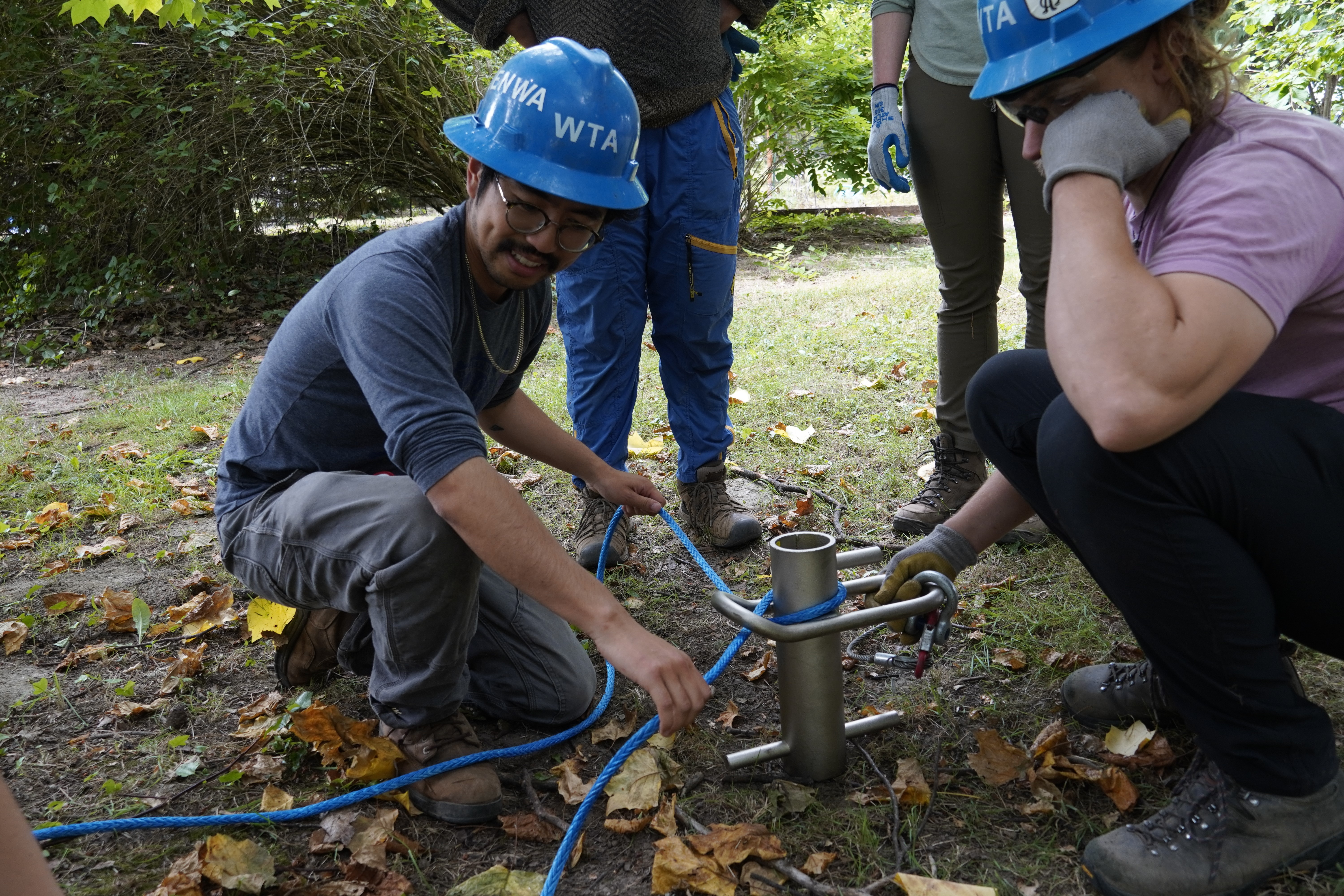 Zenwa, at work as a crew leader with Washington Trails Association.
Zenwa, at work as a crew leader with Washington Trails Association.
What drew you to the Emerging Leaders Program (ELP)?
I had used WTA as a resource for finding hikes and trail conditions for many years, and was always curious about the organization. ELP looked especially interesting to me as a way to develop professionally because of the safe and supportive structure that a shared identity affinity group provides.
What is one of your favorite memories from your season?
One of my favorite memories is when we did a backpacking trip at the Ozette Triangle on the Olympic Coast. I did not have very much backpacking experience before, and it was so much fun! There was tons of crew bonding over the course of the season, but there's something about walking along the beach together that felt special.
What is something that you are proud of from the season/were able to takeaway?
I am proud of the wide variety of skills I learned, both hard and soft. ELP taught me so much about trail work, how to be a better communicator, and how to navigate difficult conversations in a professional manner. Work aside, my favorite takeaway is the connections I made. Everyone on the crew is doing their own thing now, and I feel super lucky that I got to cross paths with them, even if it was for a short amount of time.
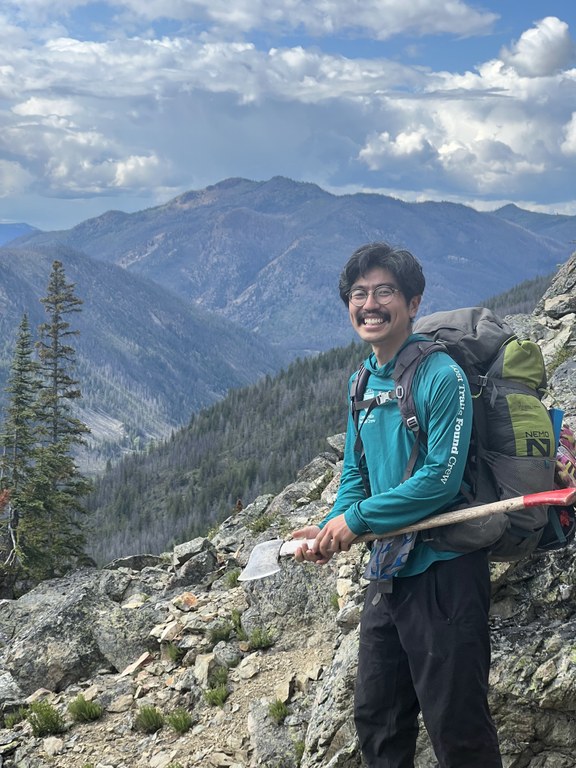 Zenwa's taking years of trail maintenance experience into his role of assistant crew leader this season. Photo by Savanna Lopez
Zenwa's taking years of trail maintenance experience into his role of assistant crew leader this season. Photo by Savanna LopezHow has ELP aided your professional goals? What do you do now?
ELP provided me with the foundation of my trail work skills, giving me the experience necessary to join WTA's Lost Trails Found crew. Currently, I am in my third season with the Lost Trails Found crew, and I was an Assistant Crew Leader and am currently a Crew Leader.
What advice would you give to any BIPOC individual interested in ELP? Or entering the outdoor field?
If you are interested in ELP, definitely apply, and if you don't get it, don't get discouraged. The first time I applied to ELP, I had zero experience in the outdoor field, and I did not get the job. Instead, I spent the year in an AmeriCorps position, which though it did not pay well, provided me with enough experience to get accepted when I applied to ELP a second time. If you are based in the Seattle area, I would also recommend checking out Environmental Professionals of Color (EPOC) on social media. They organize networking meetups, and post job listings as well.
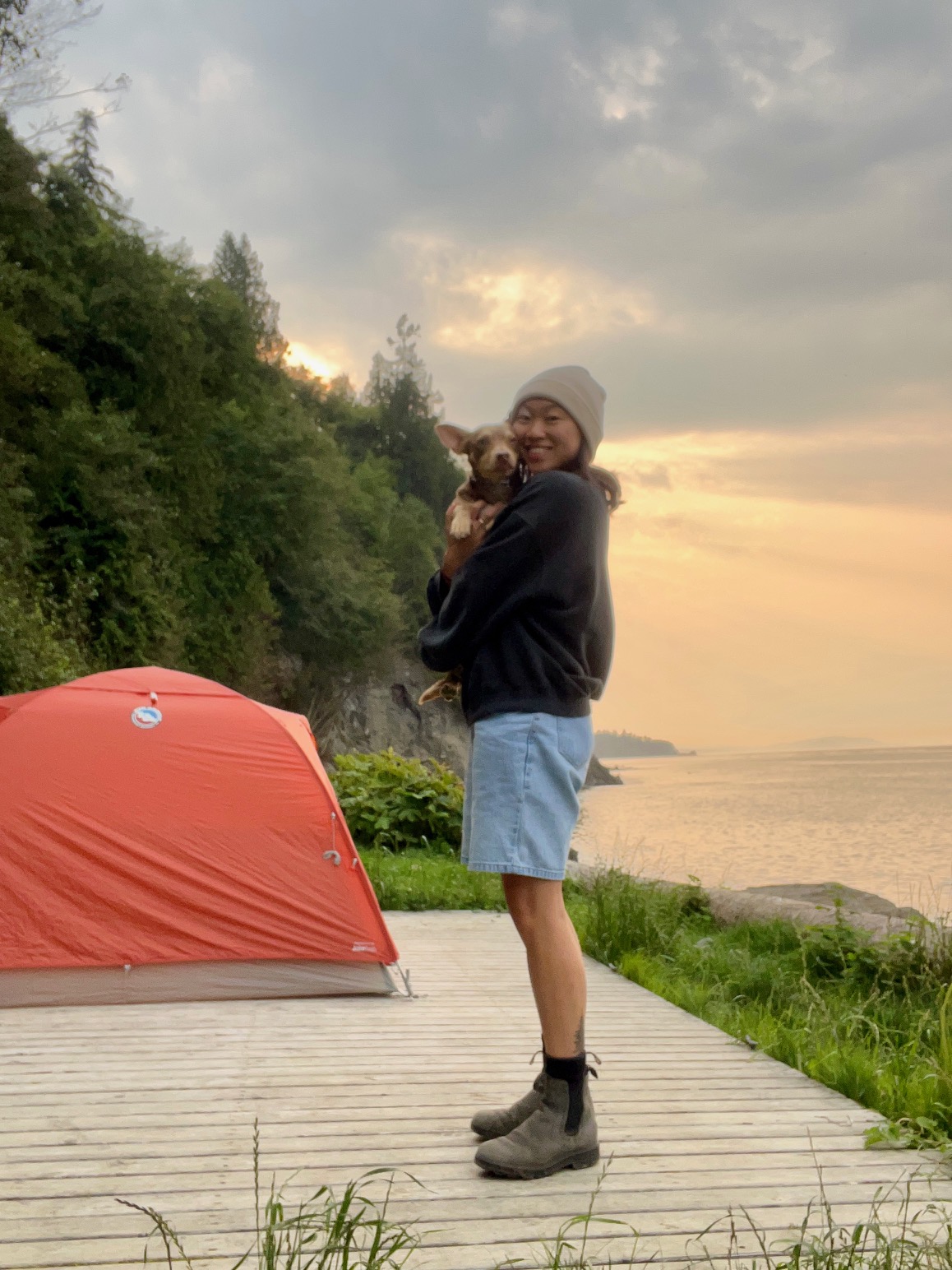
What drew you to the Emerging Leaders Program (ELP)?
There were a few reasons I was compelled to apply for ELP (which was called the Leadership and Inclusion Program (L&I) when I joined). It was the summer of 2020, when job openings everywhere were very limited due to the pandemic. I had also only just graduated the year prior from University of Washington, when I was ready to begin the journey on my professional career path. That year, I followed Outdoor Asian WA on Facebook where someone from the WTA staff had posted about their brand new pilot program to be launched that year.
I have lived in Washington state my entire life and embracing the outdoors has been such an integral part of my life. It felt exciting to think that working in the environmental field would be a possibility for me, especially since it was not a field of study for me in college and I recognized that it was (and continues to be) a White-dominated industry. When I saw that no experience was necessary to apply, I quickly submitted my application and pretty soon I found myself meeting the sweet crew of six for the first time a couple months later. The first ever paid trail crew at WTA, and we were all people of color. So cool.
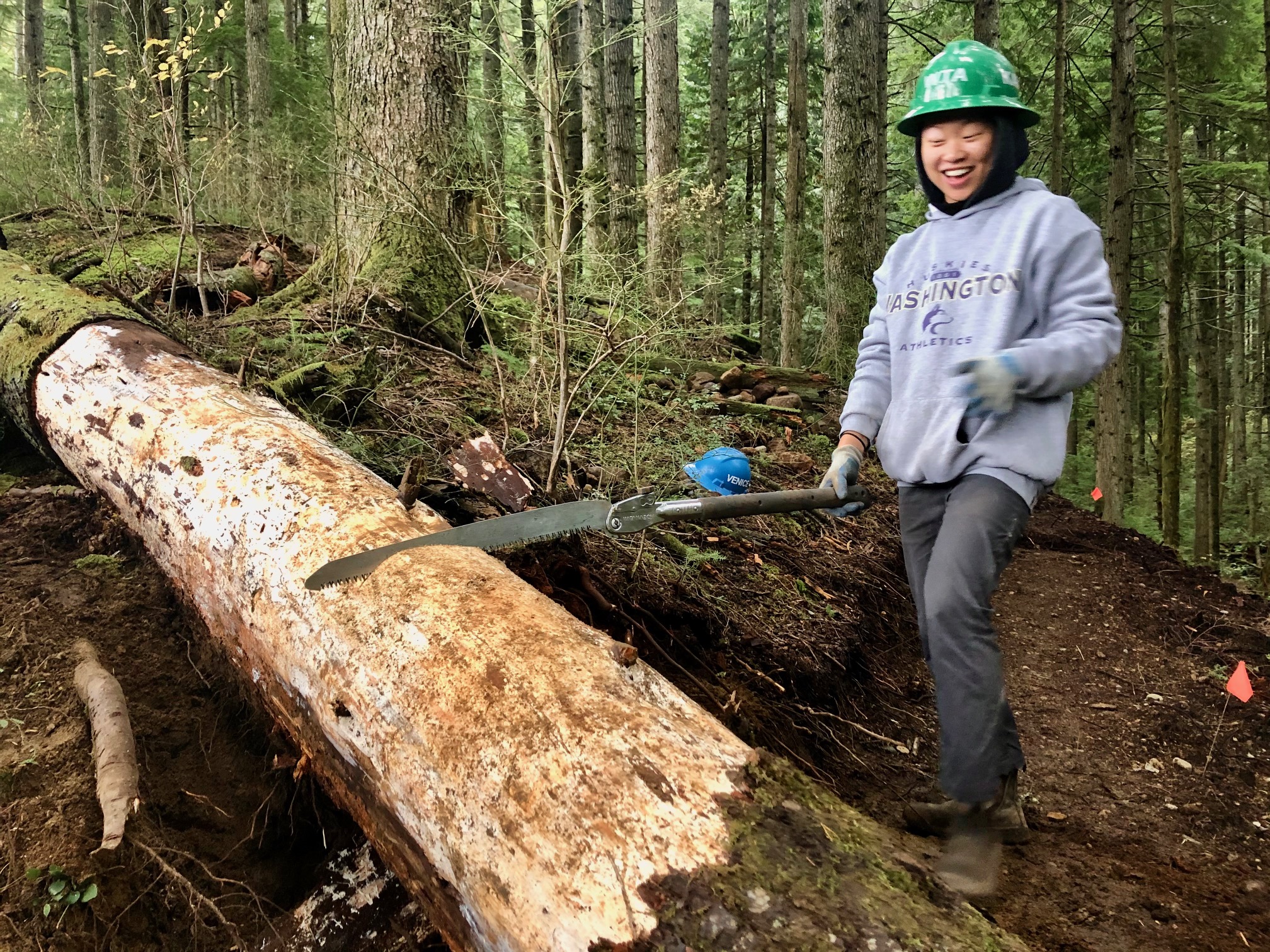
What is one of your favorite memories from your season?
Wow so many, it’s hard to pick just one. Our very first project was at Mount Rainier, where we were based for a couple weeks. We were granted access to a national park certified vehicle where we could get to an easy entry point to one of the most breathtaking views of the mountain, or really any mountain, that I have ever seen. This is one example of several incredibly stunning sites we got to visit. They were reminders of how majestic the landscape of Washington truly is.
What is something that you are proud of from the season/were able to takeaway?
I am proud that I was able to challenge myself and put myself through uncomfortable situations I have never experienced before. For one, the physical labor of the job really toughened me and made clear how much strength my body carries given the unpredictability of harsh winter conditions in the mountains and steep climbs with tools we were faced with at times. I gained extensive knowledge about hiking trail maintenance and construction that really excited me and sparked interest within me. Also, I had the chance to open up with new people and grow in my unique leadership ability in ways that I needed. Experiencing all of that during a global pandemic, I found hope again that I was headed in a direction that felt aligned with what I could see myself doing in the future.
How has ELP aided your professional goals? What do you do now?
The Leadership and Inclusion Crew definitely was an experience that helped guide me to where I am today, especially reflecting on the timing of my life post-grad. When the program ended in the Spring of 2021 and after a brief hiatus of unemployment, I began my previous role as a Youth Environmental Program Crew Leader for a nonprofit that serves Refugee and Immigrant communities in South King County. After working in that role for a year, I came to the realization that the environmental field was actually not where I saw myself working long term but through that job I discovered where my passion truly was, youth empowerment work. I worked at an organization centered around youth mentorship until the end of 2023 before finding myself returning back to the same nonprofit where I worked as a Crew Leader but now as Program Coordinator for our new Refugee Youth Mentorship Program, which I helped build from the ground up to create a lasting impact on newly arrived youth in Washington.
What advice would you give to any BIPOC individual interested in ELP? Or entering the outdoor field?
If you are a person of color who loves and appreciates the outdoors but are new to the outdoor field, go for it and apply! The only way to get closer to what you want to be doing in life is to have new experiences and realize what isn’t for you. If I did not have the experience of joining ELP in 2020, I may not have ended up working in an area of work that I am passionate about. I also would not have had the opportunity to visit such breathtaking places around Washington, to have been challenged to think deeper about the land and the efforts that go into hiking trail maintenance, to have met some amazing BIPOC folks with mutual enthusiasm and love for the outdoors, and I would not have been able to experience the particularly magical growth I went through during those 6 months being part of the L&I Crew. I will forever be grateful I had the opportunity to be part of the program!
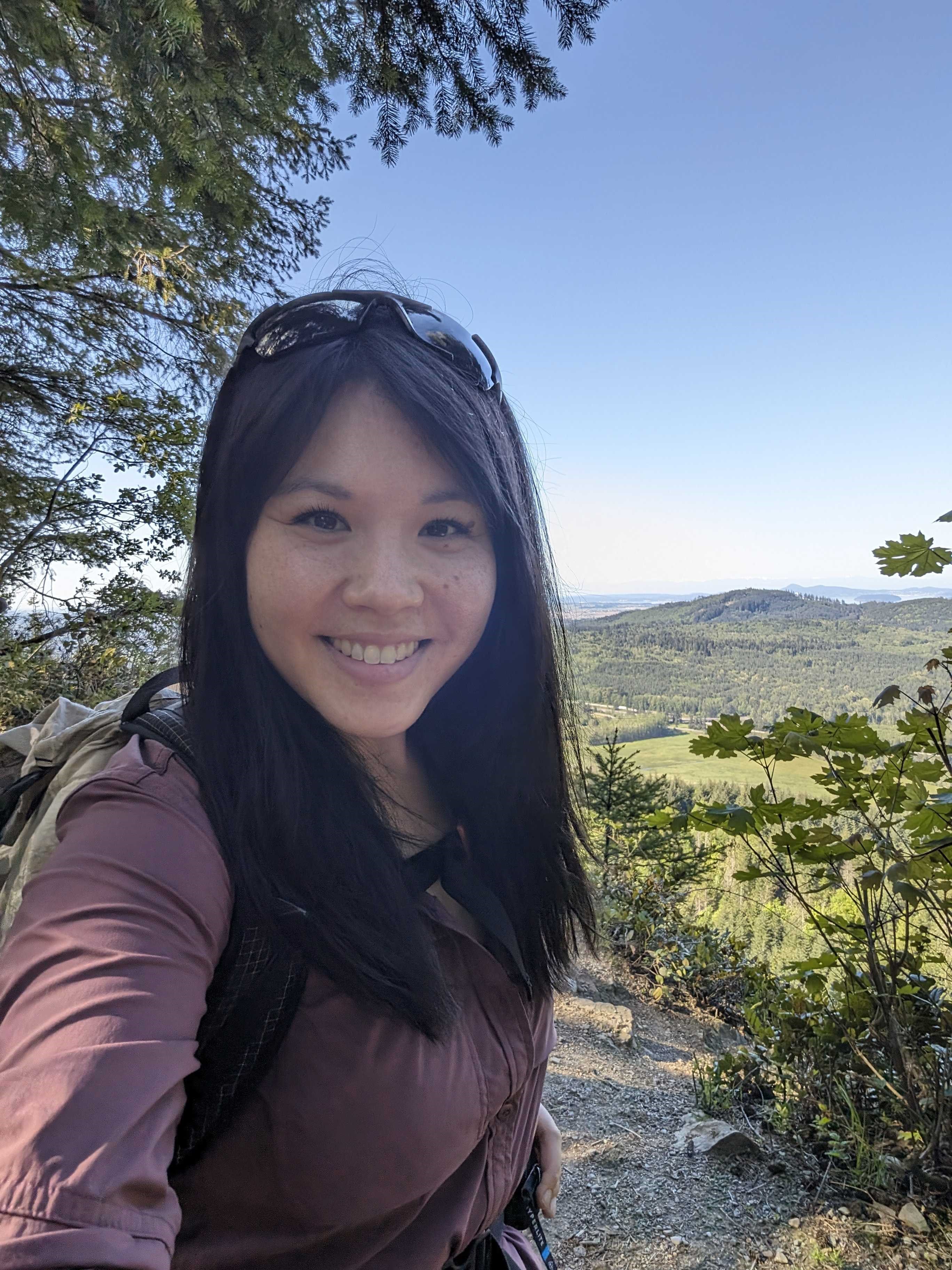 Tiffany has turned a passion for hiking into a career with WTA helping others find their way on trail.
Tiffany has turned a passion for hiking into a career with WTA helping others find their way on trail.
What drew you to the Emerging Leaders Program (ELP)?
I used WTA’s Hiking Guide and online resources when I first started hiking, and followed WTA on social media. But I had never done trail work before, and I was intrigued by the idea of ELP. I liked that I could learn how to do trail work in a low-pressure environment, with other folks with similar backgrounds and goals. Working with tools intimidated me, so trail work never felt within my reach. ELP seemed like a nice way to ease into it.
What is one of your favorite memories from your season?
One of my favorite memories during my ELP season was during one of several work parties at Twin Falls. We encountered all sorts of weather while putting a crib wall together, including below-freezing temps. After a long day in the rain, a few of us decided to hike up to Twin Falls. The falls were roaring and we were soaked, but it was fun to spend non-work time with my cohort. It was a rainy weekday, so the trail was quiet. To this day, I have never seen the falls flowing as quickly as they were that day!
What is something that you are proud of from the season/were able to takeaway?
I left ELP with over 20 days of trail work over 12 weeks. Using tools that require some finesse has always made me nervous. I'm afraid I’ll do it wrong or that people will judge me for messing up. So I was pretty excited to leave ELP with that much trail work under my belt.
I left learning that trail work was not my favorite thing to do. I have a lot of love for trails. but you probably won't find me being a crew leader or ACL anytime soon. That said, I loved getting to give back to my trails and was proud of the new trail work and leadership skills I left with.
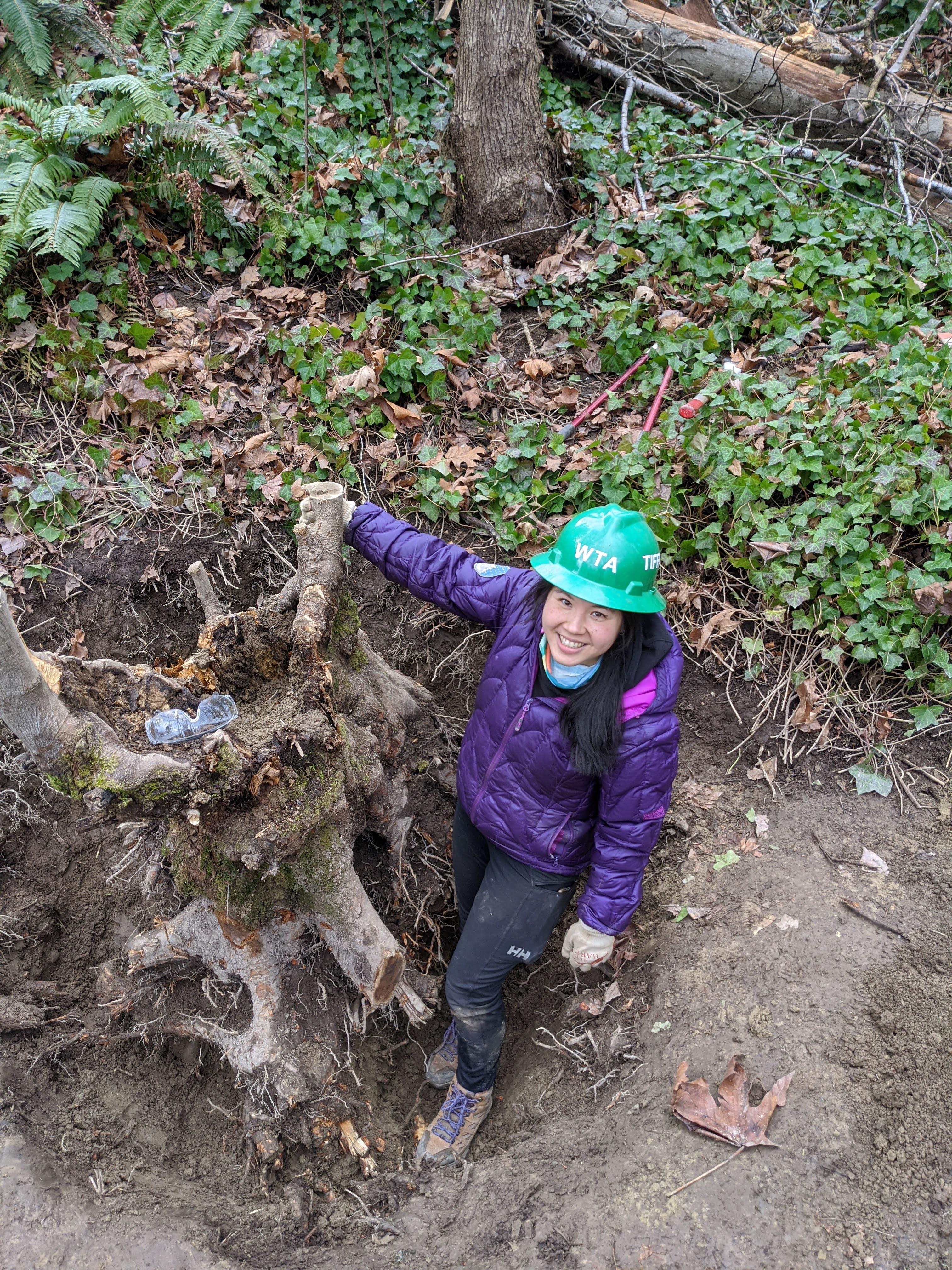 Tiffany getting her hands dirty helping trails. Photo by Zachary Toliver.
Tiffany getting her hands dirty helping trails. Photo by Zachary Toliver.
How has ELP aided your professional goals? What do you do now?
When I joined ELP, I was in a weird career transitional phase. I had left the tech industry, realizing it was not where I wanted to be. I really wanted to find something new and outside. I had been working seasonally outside for a couple of years, and I wanted something stable. ELP felt like a really good pathway to finding something full-time, long-term, year-round.
After ELP, a communications coordinator position at WTA opened up at exactly the right time. I feel very lucky that that happened. I still had to go through the whole interview process and be considered among all of the other candidates. But I also think that I walked into the application and the interview feeling very much like I could do this, working in external communications for an organization whose mission I believe in. My ELP independent project was helping work on the WTA Hiking Guide.
Right now, I work as the communications coordinator at WTA. which means that I spend a lot of time writing. I typically will end up sharing stories of other hikers and sharing resources that hopefully can help hikers feel more comfortable being outside. I also help maintain our Hiking Guide.
What advice would you give to any BIPOC individual interested in ELP? Or entering the outdoor field?
I left a separate career that I had essentially trained for my entire life for the outdoor industry, so at 27, 28, I had to humble myself and be like, okay, I'm starting over. I got a seasonal job that college students with minimal experience could get. I was older than many coworkers, which felt weird, but I was new to the industry with no connections or experience. Growing up, my parents put a lot of pressure on me to achieve academically and professionally, so it was tough to walk away from that first well-established career. But I was building up this new resume, and I actually loved my seasonal outdoor job. It didn't pay much and had no benefits, but I got great experience.
It was because of that job I got the ELP position, and it was because of ELP that I got my current job. My advice is if you're new to the outdoor field and you're coming from a different place, just go find something. Counseling at a summer camp or working the lifts at a ski resort. Anything that gets you outside adds to your resume. I’ve found that the outdoor industry is relatively small — making connections with one org will likely open up doors at others. Don't burn bridges, make friends and more than likely they will introduce you to their people and you’ll have many new opportunities — and many new friends!
For ELP specifically, ask yourself what it is that you would get out of it. ELP is a unique place to be. You’ll work with the same people for 14 weeks. You'll get to work on some projects long-term. And you’ll get to work with other people of color, people who maybe have experiences that you can relate to. If that appeals to you, this is probably the program for you. If you're more interested in just trail work, we have volunteer work parties and Lost Trails Found crews that have an even deeper focus on trail work.
The Emerging Leaders program is now in its fourth iteration with numerous sustained collaborations and exciting partnerships. Applications for the 2025 ELP cohort year are open now.